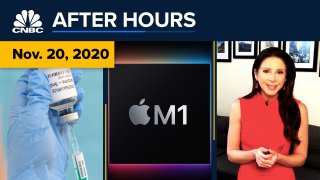
CNBC.com's MacKenzie Sigalos has the day's top business news headlines. Pfizer submitted its Covid-19 vaccine to the FDA for emergency authorization today, kicking off the first step of the approval and deployment process. But CNBC's Bertha Coombs explains how, at the same time, the combination of rising infection rates and Thanksgiving travel prep is putting a strain on some clinics that offer tests for the virus. Plus, the "After Hours" team dives into the rave reviews for Apple's new M1 chips.
Pfizer and BioNTech request emergency authorization from FDA for Covid vaccine
Pfizer and BioNTech on Friday applied for an emergency use authorization from the Food and Drug Administration for their coronavirus vaccine.
If Pfizer's application is approved, the vaccine will likely be limited and rolled out in phases, with health-care workers, the elderly and people with underlying health conditions getting the first inoculations. Essential workers, teachers and people in homeless shelters and prisons would likely be next, followed by children and young adults.
The FDA process is expected to take a few weeks, and an advisory committee meeting to review the vaccine has been tentatively scheduled for early December. Some Americans could get their first dose of the vaccine in about a month.
CDC urges Americans against traveling for Thanksgiving as coronavirus outbreak worsens
The Centers for Disease Control and Prevention on Thursday advised Americans not to travel for the Thanksgiving holiday to help prevent the spread of the coronavirus.
Money Report
Dr. Henry Walke, the CDC's Covid-19 incident manager, said there is "no more important time than now for each and every American to redouble our efforts to watch our distance, wash our hands and, most importantly, wear a mask."
"CDC is recommending against travel during the Thanksgiving period," he said. "For Americans who decide to travel, CDC recommends doing so as safely as possible by following the same recommendations for everyday living."
Apple made a good decision to ditch Intel and develop its own chips for its Mac computers. I've been testing the $999 version of the MacBook Air with Apple's new M1 chip for the past several days, and it's faster and offers better battery life than what equivalent Intel models offered.
Companies like Microsoft have also issued laptops with lower-powered Arm-based processors from Qualcomm and others, but those computers tended to come with a lot of compromises. Microsoft's Surface Pro X, for example, didn't always support legacy apps, wasn't as powerful, and had poor battery life compared with Intel-based Windows computers. Based on my testing, the MacBook Air avoids those kinds of compromises.






